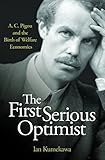The first serious optimist : A.C. Pigou and the birth of welfare economics / Ian Kumekawa.
Material type: TextPublisher: Princeton, New Jersey : Princeton University Press, [2017]Description: 1 online resource (x, 332 pages) : illustrationsContent type:
TextPublisher: Princeton, New Jersey : Princeton University Press, [2017]Description: 1 online resource (x, 332 pages) : illustrationsContent type: - text
- computer
- online resource
- 9781400885206
- 1400885205
- Pigou, A. C. (Arthur Cecil), 1877-1959
- Pigou, A. C. (Arthur Cecil), 1877-1959
- Pigou, A. C. (Arthur Cecil), 1877-1959
- Economists -- Great Britain
- Welfare economics
- Economics -- History
- Économistes -- Grande-Bretagne
- Économie du bien-être
- Économie politique -- Histoire
- BUSINESS & ECONOMICS -- Economics -- General
- BUSINESS & ECONOMICS -- Reference
- Economics
- Economists
- Welfare economics
- Great Britain
- Wirtschaftstheorie
- Wohlfahrtstheorie
- 330.15/56092 23
- HB103.P54 K86 2017eb
- QE 800
| Item type | Home library | Collection | Call number | Materials specified | Status | Date due | Barcode | |
|---|---|---|---|---|---|---|---|---|
 Electronic-Books
Electronic-Books
|
OPJGU Sonepat- Campus | E-Books EBSCO | Available |
Includes bibliographical references (pages 293-320) and index.
Online resource; title from digital title page (ProQuest Ebook Central, viewed June 15, 2017).
Introduction: history and economics -- Beginnings -- Ethics, politics, and science -- Bearing fruit as well as light: Pigou's welfare economics -- War, peace, and disillusionment -- Retreat to the ivory tower -- Paradigms lost -- Another war and a fresh start -- To "really do a little good:"a redemptive conclusion -- Epilogue.
The First Serious Optimist is an intellectual biography of the British economist A.C. Pigou (1877-1959), a founder of welfare economics and one of the twentieth century's most important and original thinkers. Though long overshadowed by his intellectual rival John Maynard Keynes, Pigou was instrumental in focusing economics on the public welfare. And his reputation is experiencing a renaissance today, in part because his idea of "externalities" or spillover costs is the basis of carbon taxes. Drawing from a wealth of archival sources, Ian Kumekawa tells how Pigou reshaped the way the public thinks about the economic role of government and the way economists think about the public good. Setting Pigou's ideas in their personal, political, social, and ethical context, the book follows him as he evolved from a liberal Edwardian bon vivant to a reserved but reform-minded economics professor. With World War I, Pigou entered government service, but soon became disenchanted with the state he encountered. As his ideas were challenged in the interwar period, he found himself increasingly alienated from his profession. But with the rise of the Labour Party following World War II, the elderly Pigou re-embraced a mind-set that inspired a colleague to describe him as "the first serious optimist."The story not just of Pigou but also of twentieth-century economics, The First Serious Optimist explores the biographical and historical origins of some of the most important economic ideas of the past hundred years. It is a timely reminder of the ethical roots of economics and the discipline's long history as an active intermediary between the state and market.
In English.
eBooks on EBSCOhost EBSCO eBook Subscription Academic Collection - Worldwide
There are no comments on this title.

